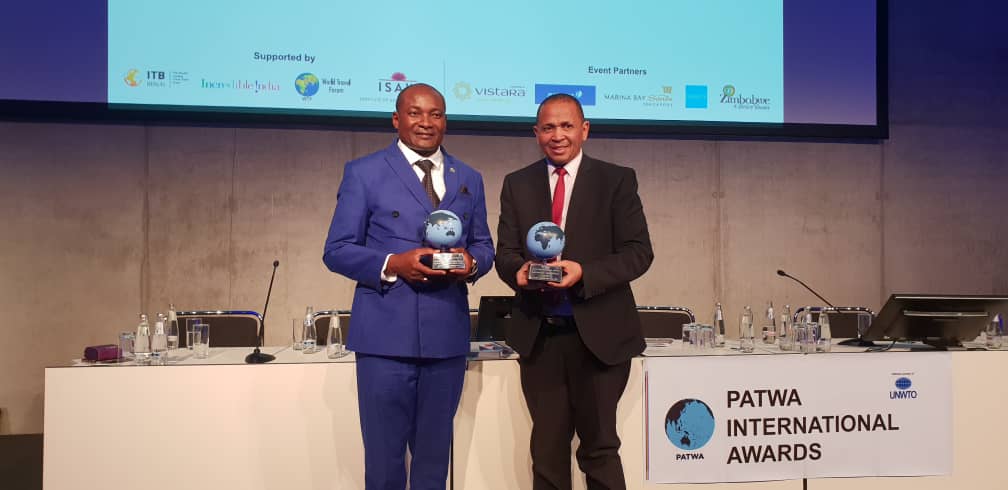
The ITB Organisation
The International Council of Pacific Area Travel Writers Association
The Namibian Tourism Community and Compatriots
All fellow guest from around the World
Allow me to greet you with profound happiness and delight to stand before you and address you at this auspicious event.
On behalf of Namibia, we are humbled and feel privileged to have beeb recognised and honored with the Award for Best Safari and Wildlife Destination for 2019 by the International Council of Pacific Area Travel Writers Association.
The success story that you are witnessing today through this award stem from the Government of Namibia realising right at the onset at Independence in 1990 that our natural assets is the bedrock of our tourism industry and ensured that the protection of Namibia’s nature and wildlife was enshrined in the republic's constitution.
Namibia strives for the maintenance of its ecological biodiversity for the benefit of its citizens and the world. Namibia’s conservation is therefore based on three pillars.
One of such pillars include conservation across the borders in the form of Transfontier Conservation Areas. Through this approach Namibia is integrating the aspect of conservation to other countries in the SADC region to ensure that fragmented wildlife habitats are joined into an interconnected mosaic of protected areas and transboundary wildlife corridors, which facilitates and enhances the free movement of animals across international borders. Furthermore, they promote a long term protection and sustainable use of natural resources, and cultural heritage within member countries.
Namibia is member to three transfrontier Conservation Areas which are, Kavango Zambezi Transfrontier Conservation Area; The /Ai /Ais- Richterveld Transfrontier Park and the Iona Skeleton Coast Tranfronteir Park.
Another pillar is the internationally acclaimed Community Based Natural Resources programme which empowers communities and creates incentives for sustainable development and co-existence with wildlife.
Namibia has gained a worldwide reputation for its innovative approaches of linking conservation to poverty alleviation through this conservancy program and pro-poor tourism initiatives. This programme will continue to provide communities with incentives to manage and conserve their areas and natural resources to unlock enormous tourism development opportunities and benefits from the use of wildlife.
There are currently eighty-three (83) registered conservancies in Namibia today, benefiting thousands of our rural communities through employment, cash income, social projects and in-kind benefits.
Another pillar is the protected areas network that includes the country’s national parks. This is significant for economic development through tourists attraction to such protected areas. Namibia has 20 state run protected areas covering about 17 per cent of the country's land surface. The Protected Areas conserve biodiversity and ecosystem by protecting some of the country's most important habitats and species of national and global significance.
We proud ourselves as among the global leaders in conservation and that we are offering yo all tourists of the world not only a safe and incredible safari and wildlife experience but we offer an opportunity to contribute to ecological preservation and biodiversity protection.
Let me take this opportunity to extend my appreciation to our whole vibrant tourism community who continue with pasdion to invest innovate and enhance our tourism offering, provide excellent services and deliver memorable experiences to all our visitors both international and domestic.
As we celebrate this award, i want to give the main credit to the women and men in our rural areas who for them living with wildlife means striving for balanced land use and a healthy environment. Game does not need to be eradicated from a landscape because it may pose a treat to crops or livestock but can be integrated with other rural livelihood activities.
Community conservation covers over 163, 396 km2, which is about 53,4% of all communal land. Conservancies manage 19.4% land of Namibia and contributes in excess of 4 billion to the country's bet national income. Community conservation supports wildlife recoveries and environmental restoration.
The Awards to Namibia could not have come a better time than now, when we are battling to control poaching of our rhinos and elephants. This will encourage us as the authority and our various stakeholders to do more to stop poaching of high value species.. I’m informed that the nomination shortlist is made each year by a jury and recommendations of the PATWA International council and members across many countries.
On behalf of my country and my people I accept this award with gratitude to PATWA for having recognised our efforts in conservation for tourism development.
I thank you

